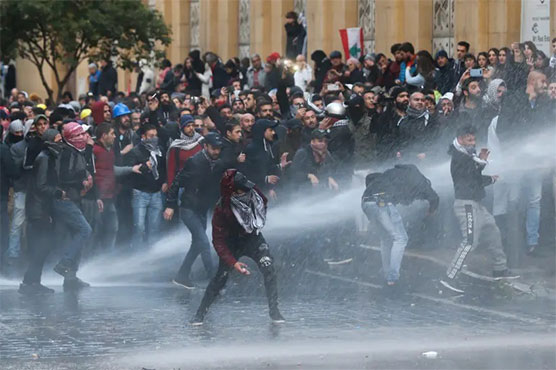Hundreds wounded in weekend of Lebanon clashes

Medics said 145 people were wounded in the latest clashes in Lebanon's capital on Sunday.
BEIRUT (AFP) - Lebanese anti-riot police dispersed stone-throwing protesters with tear gas in Lebanon s capital on Sunday, as heavy rain capped a weekend of rare violence that wounded hundreds.
Medics said 145 people were wounded in the latest clashes, taking the casualty toll to more than 530 in two days.
Thick clouds of white tear gas billowed in central Beirut, as police pushed protesters out of a flashpoint road near parliament after hours of clashes, before the downpour largely cleared the streets.
Unprecedented protests have rocked the country since October 17, with citizens from all religious backgrounds demanding the ouster of a political class viewed as inept, corrupt and responsible for an ever-deepening economic crisis.
For a second night in a row, dozens of people started lobbing stones at police behind a metal barricade blocking a road to parliament, crying "revolution, revolution".
Anti-riot forces responded with water canons, rubber bullets and then thick plumes of tear gas that pushed demonstrators back towards a main square, an AFP reporter said.
The Red Cross said more than 145 people were injured, including 45 who needed treatment in hospital.
The state-run National News Agency (NNA) said two journalists were hit by rubber bullets, one a cameraman from local television channel Al-Jadeed.
President Michel Aoun called for a "security meeting" on Monday with the interior and defence ministers to discuss the crisis, NNA reported.
But a 34-year-old protester called Mazen said he and others had lost hope in politicians.
"After three months of revolution, they have proven to us that they don t change, don t listen, and have nothing to give," he said.
On Saturday, at least 377 people were wounded -- both protesters and members of the security forces -- according to a toll compiled by AFP from figures provided by the Red Cross and Civil Defence.
Lawyers said more than 40 protesters were arrested on Saturday before being released.
Most were subjected to "excessive violence", while some were wounded "especially to the head and face, and genitals", the Committee of Lawyers for the Defence of Protesters said on Facebook.
The lawyers also visited hospitals, from where they reported serious injuries including some caused by rubber bullets.
On Sunday, local television aired the testimonies of relatives of two young men they said were hit in the eyes by rubber bullets.
Security forces said they had opened a probe after a video shared online showed police beating up people believed to be protesters as they were brought to a Beirut police station.
Human Rights Watch condemned what it called "the brutal use of force unleashed by Lebanon s riot police against largely peaceful demonstrators".
It accused the riot police on Saturday of "launching tear gas canisters at protesters heads, firing rubber bullets in their eyes and attacking people at hospitals and a mosque".
Saturday s clashes began after dozens of protesters threw stones and plant pots at security forces, and tried to charge police lines near parliament with traffic signs.
The security forces responded with water cannon and thick tear gas.
Protesters had called for a week of "anger" over the political leadership s failure to form a new government even as the country sinks deeper into a financial crisis.
"Another day without a government, another night of violence and clashes," UN envoy to Lebanon Jan Kubis said on Twitter.
Outgoing prime minister Saad Hariri, who stepped down on October 29, urged political parties to "stop wasting time".
"Form a government and pave the way towards political and economic solutions," he said.
Political factions agreed on December 19 to appoint former education minister Hassan Diab as the new premier but have since squabbled over proposed ministers.
Protesters have demanded a new government be comprised solely of independent experts, and exclude all established political parties.
The World Bank has warned the poverty rate in Lebanon could rise from a third to half of the population if the political crisis is not resolved soon.

